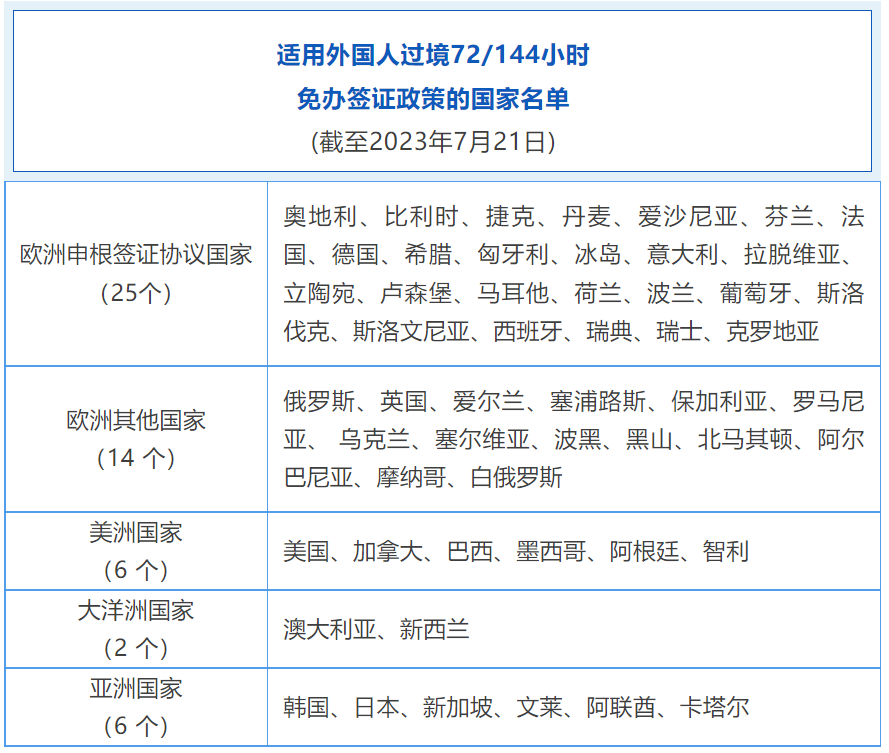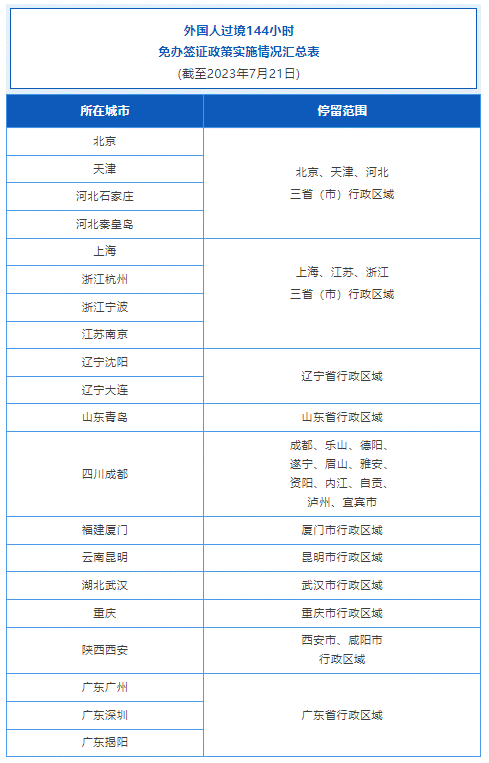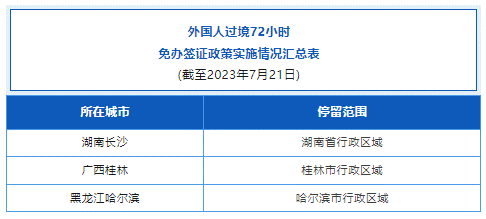Recently, the official Weibo account of National Immigration Administration (NIA) released a Q&A series on the visa-free transit policy for foreign nationals. What is the visa-free transit policy? Which countries is it applicable to? Which cities in China have implemented this policy? Follow us to find the answers!
Q: What is the visa-free transit policy for foreign nationals?
A: The visa-free transit policy for foreign nationals, widely implemented across the world, serves as a crucial component of China's visa-free system. Apart from the 24-hour visa-free transit, China also offers 72-hour and 144-hour options. As of now, 31 ports in 23 cities of 18 provinces (municipalities) in China have implemented the 72/144-hour visa-free transit policy for foreign nationals from 53 countries.
Q: Which countries are eligible for the visa-free transit policy for foreign nationals?
A: Currently, it applies to the following countries:
39 countries in Europe: Austria, Belgium, Czech Republic, Denmark, Estonia, Finland, France, Germany, Greece, Hungary, Iceland, Italy, Latvia, Lithuania, Luxembourg, Malta, the Netherlands, Poland, Portugal, Slovakia, Slovenia, Spain, Sweden, Switzerland, Monaco, Russia, the United Kingdom, Ireland, Cyprus, Bulgaria, Romania, Ukraine, Serbia, Croatia, Bosnia and Herzegovina, Montenegro, North Macedonia, Albania, Belarus;
3 countries in North America: the United States, Canada, Mexico;
3 countries in South America: Brazil, Argentina, Chile;
6 countries in Asia: Republic of Korea, Japan, Singapore, Brunei, the United Arab Emirates, Qatar;
2 countries in Oceania: Australia, New Zealand.
Q: Which cities in China have implemented the 72/144-hour visa-free transit policy for foreign nationals?
A: 20 cities have implemented the 144-hour visa-free transit policy: Beijing, Tianjin, Shijiazhuang, Qinhuangdao, Shanghai, Hangzhou, Nanjing, Shenyang, Dalian, Qingdao, Chengdu, Xiamen, Kunming, Wuhan, Guangzhou, Shenzhen, Jieyang, Chongqing, Ningbo, Xi'an;
3 cities have implemented the 72-hour visa-free transit policy: Changsha, Guilin, Harbin.
Q: What are the requirements for foreign nationals to apply for 144-hour visa-free transit?
A: First, he/she must be a citizen of one of the countries enjoying the 72/144-hour visa-free transit (please refer to the detailed list below↓↓↓);

Second, he/she must possess an international travel document (valid for at least three months) that can prove his/her nationality and identity, and meet the entry requirements for a third country or region;
Third, a connecting ticket to a third country or region with a confirmed departure date and seat within 72/144 hours or relevant certificates will be needed. Additionally, he/she must fill in the temporary arrival cards and comply with any inquiries from the immigration inspection authority.
Foreign nationals who meet the aforementioned conditions can apply for the 144-hour visa-free transit at the border inspection authorities in 20 designated cities in China, or the 72-hour visa-free transit in three cities. This policy has not yet been implemented in other cities.


Reminder
The immigration inspection authorities will not issue temporary entry permits to foreign nationals whose passports or other international travel documents are valid for less than three months, or who have a rejection stamp by China’s visa authorities, or who have illegal entry and exit, illegal residence, illegal employment records, etc. within five years. Such individuals are not eligible for the 72/144-hour visa-free transit.
Q: What should be noted during the 72/144-hour visa-free transit in China?
A: Foreign nationals should pay attention to the following two aspects upon entering China:
First, adhere to the designated area and time constraints.
The duration of stay as referred to in the 144-hour visa-free transit policy will begin from 00:00 o'clock on the day following entry. For example, if a foreign national enjoying the 144-hour transit enters China on January 1, the duration of stay will begin from 00:00 o'clock on January 2. He/she may stay within the visa-free transit area for a maximum of six days at most and must depart before 00:00 on January 7.
In case of force majeure that requires a period of stay longer than 72/144 hours in the designated area, he/she shall lodge an application to the exit and entry administration department of the public security authority for the necessary stay documents.
Second, register accommodation information in accordance with the law.
Foreign nationals staying in hotels under the 72/144-hour visa-free transit shall have their accommodation information registered in the hotel. For those who reside or stay in lodgings other than hotels, they or their hosts shall, within 24 hours after the foreign national's check-in, go through the registration formalities at the police stations of the local public security organs.
Reminder
Foreign nationals within the territory of China shall abide by the laws of China. Those who travel beyond the visa-free area or time limit, exit from unspecified ports, or fail to register their accommodation information as required by law, will be subject to legal penalties imposed by the immigration inspection authorities or local public security authorities.
(Based on relevant content from the official Weibo account of the NIA)


